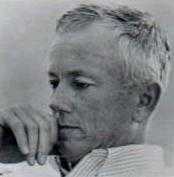Lewis Elliott Chaze
| Lewis Elliott Chaze | |
|---|---|
 | |
| Born |
Lewis Elliott Chaze November 15, 1915 Mamou, Louisiana |
| Died | November 11, 1990 (aged 74) |
| Pen name | Elliott Chaze |
| Occupation | Novelist, journalist |
| Alma mater | University of Oklahoma |
| Period | 1947-1986 |
| Genre | Mystery, crime |
| Notable works |
Goodbye Goliath Black Wings Has My Angel |
Lewis Elliott Chaze (November 15, 1915 – November 11, 1990) was an American war veteran, journalist, and novelist.[1]
Biography
Early years
Elliott Chaze was born to Lewis and Sue Chaze in Mamou, Louisiana.[2] In 1932, Chaze graduated from Bolton High School in Alexandria, Louisiana. He attended Tulane University, Washington and Lee University, and graduated from the University of Oklahoma in 1937.
Chaze began his journalism career as a reporter for the New Orleans Bureau of the Associated Press.[2] During World War II, he served as a paratrooper and technical sergeant in the 11th Airborne Division of the U.S. Army.[1] After hostilities ended, Chaze continued to serve for a time in the Occupation of Japan.[2]
Journalist
After the war, Chaze rejoined the Associated Press (AP) in New Orleans, then transferred to the APs Denver Bureau. In 1951, Chaze moved to Mississippi, began working as a reporter and became an award-winning columnist for the Hattiesburg American newspaper in the city of Hattiesburg.[1] While at the Hattiesburg American, Chase received the Hal Boyle Memorial Award for the best personal newspaper column.[3]
Chaze was married to Mary Vincent Armstrong with whom he had five children.[4]
Chaze became City Editor of the Hattiesburg American in 1970 and remained in that position through 1980. Chaze wrote articles, essays, and short stories for popular magazines of the time, including Collier's, Cosmopolitan, Life, Reader's Digest, Redbook, and The New Yorker.[3][5]
Novelist
Chaze's works of fiction reflected many of his own experiences and were praised by reviewers as being authentic and filled with local color.[2] The Stainless Steel Kimono, published in 1947, was Chaze's first novel. His most controversial novel, Tiger in the Honeysuckle, dealt with the civil rights struggle of the 1960s.
In an interview regarding his motivation for writing fiction, Chaze is reported to have responded: "Primarily I have a simple desire to shine my ass — to show off a bit in print." [5] During his career, Chaze produced at least ten novels that were published. The novels, and year of publication, were as follows:
- The Stainless Steel Kimono (1947)
- The Golden Tag (1950)
- Republished as: Love on the Rocks (1956)
- Black Wings Has My Angel (1953)
- Republished as: One for My Money (1962), One for the Money (1985)
- Two Roofs and a Snake on the Door (1963)
- Tiger in the Honeysuckle (1965)
- Wettermark (1969)
- Goodbye Goliath (1983)
- Mr. Yesterday (1984)
- Little David (1985)
- The Catherine Murders (Connoisseur Crime) (1986)
References
- ↑ 1.0 1.1 1.2 Elliott Chaze
- ↑ 2.0 2.1 2.2 2.3 Keys, M. 1981. Lives of Mississippi Authors, 1817 —1967 (edited by James B. Lloyd). The University Press of Mississippi.
- ↑ 3.0 3.1 Templeton, Kara. 2008. Mississippi Writers: Lewis Elliott Chaze
- ↑ Lewis Elliott Chaze
- ↑ 5.0 5.1 Pronzini, Bill. 2007. Mystery File: Bill Pronzini on Elliott Chaze.